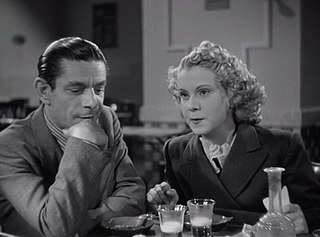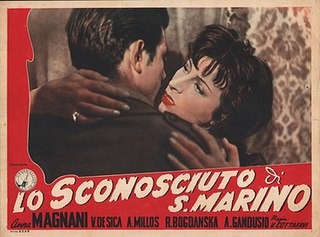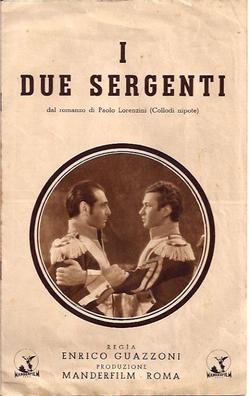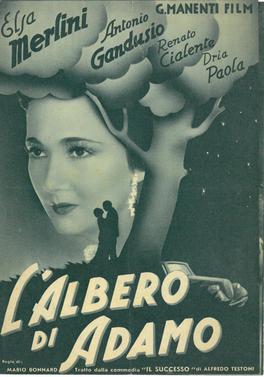Related Research Articles

Marriage is a 1954 Italian historical comedy film directed by Antonio Petrucci and starring Vittorio De Sica, Silvana Pampanini and Alberto Sordi. It consists of three segments, based on three stage plays by Anton Chekhov.

At Your Orders, Madame is a 1939 Italian "white-telephones" comedy film directed by Mario Mattoli and starring Antonio Gandusio.

We Were Seven Widows is a 1939 Italian "white-telephones" comedy film directed by Mario Mattoli and starring Antonio Gandusio.

Nino Besozzi was an Italian film actor. He appeared in more than 50 films between 1931 and 1970. He was born in and died in Milan, Italy.

Nothing New Tonight is a 1942 Italian drama film directed by Mario Mattoli and starring Alida Valli, Carlo Ninchi and Antonio Gandusio. It was shot at the Safa Palatino Studios in Rome. The film's sets were designed by the art directors Piero Filippone and Mario Rappini.

Lively Teresa is a 1943 Italian "white-telephones" comedy film directed by Mario Mattoli and starring Lilia Silvi, Roberto Villa and Carlo Ninchi. It was produced in the style of the White Telephone comedies popular during the Fascist era.

Totò Tarzan is a 1950 Italian comedy film directed by Mario Mattoli and starring Totò, Marilyn Buferd and Alba Arnova. It is a parody of Edgar Rice Burroughs's novel Tarzan of the Apes. It was shot at the Farnesina Studios in Rome. The film's sets were designed by the art director Piero Filippone. As with Totò's other films of the era it was a commercial success, taking around 385 million lira at the box office.

Antonio Gandusio was an Italian film actor. He appeared in 34 films between 1914 and 1948. He was born in Rovigno and died in Milan, Italy.

The Unknown Man of San Marino is a 1946 Italian drama film directed by Michał Waszyński and starring Anna Magnani, Vittorio De Sica and Antonio Gandusio.

Olinto Cristina was an Italian actor and voice actor.

Abracadabra is a 1952 Italian comedy film directed by Max Neufeld and starring Mario Riva, Riccardo Billi and Lilia Landi. It was shot at Cinecittà Studios in Rome. The film's sets were designed by the art directors Alfredo Montori and Camillo del Signore.
The Ancestor is a 1936 Italian comedy film directed by Guido Brignone and starring Antonio Gandusio, Paola Barbara and Mercedes Brignone. It is an adaptation of a play by Carlo Veneziani, and was made at the Palatino Studios in Rome.

The Two Sergeants is a 1936 Italian historical drama film directed by Enrico Guazzoni and starring Evi Maltagliati, Gino Cervi and Mino Doro. It was based on the play The Two Sergeants by Theodore d'Aubigny, which has been made into films several times. It is set in the Napoleonic Wars. The film marked the debut of Alida Valli who had until recently been a student of the Centro sperimentale di cinematografia. Valli went on to be a leading star of Italian cinema.

Dina Galli was an Italian actress known for her comic stage roles. Galli also appeared in fourteen films during her career.
The Story of a Poor Young Man is a 1920 Italian silent drama film directed by Amleto Palermi and starring Luigi Serventi, Pina Menichelli and Antonio Gandusio. It was one of numerous film adaptations of Octave Feuillet's novel of the same name.
For Men Only is a 1938 Italian "white-telephones" comedy film directed by Guido Brignone and starring Antonio Gandusio, Carlo Buti and Paola Barbara.

Adam's Tree is a 1936 Italian White Telephone comedy film directed by Mario Bonnard and starring Elsa Merlini, Antonio Gandusio and Renato Cialente. The film's sets were designed by the art director Guido Fiorini.

Wedding Day is a 1942 Italian "white-telephones" comedy film directed by Raffaello Matarazzo and starring Armando Falconi, Amelia Chellini and Anna Proclemer.

The Three Wishes is a 1937 Italian "white-telephones" romantic comedy film directed by Giorgio Ferroni and Kurt Gerron and starring Luisa Ferida, Antonio Centa and Leda Gloria. It was shot at the Cinecittà Studios in Rome. The film's sets were designed by the art director Guido Fiorini. A separate Dutch version, The Three Wishes, was also made.

Territorial Militia is a 1935 Italian comedy film directed by Mario Bonnard and starring Antonio Gandusio, Rosina Anselmi and Leda Gloria. The film's sets were designed by the art director Virgilio Marchi.
References
- ↑ Roberto Chiti; Roberto Poppi; Enrico Lancia (2005). Dizionario del cinema italiano: I film. Gremese, 1991. ISBN 8884403510.